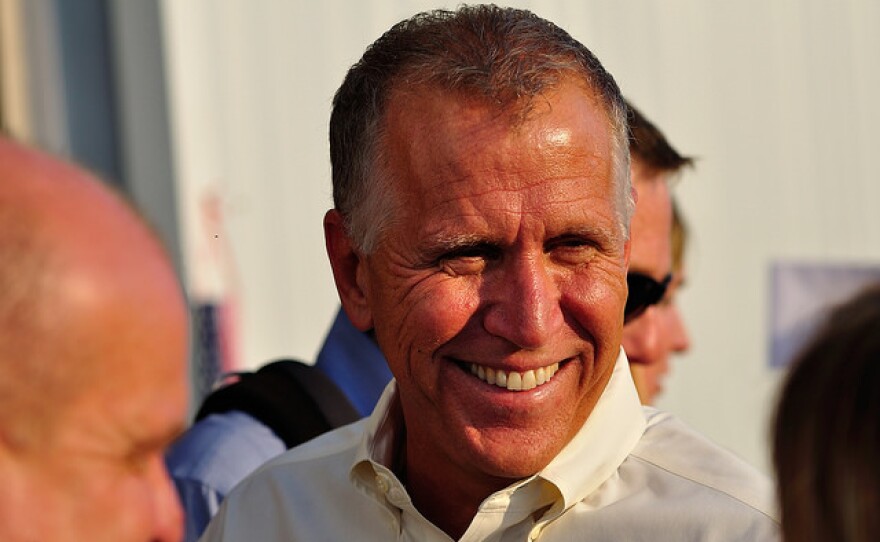U.S. Senator Thom Tillis (R-NC) quickly ascended from a seat on the parks and recreation commission in Cornelius, N.C., to speaker of the North Carolina House in 2011, and finally U.S. Senator.
In his first five months, Tillis has taken a particular interest in the military with seats in the Committee on Armed Services and the Committee on Veterans' Affairs.
Host Frank Stasio talks with Tillis about national security, deregulation, immigration and other issues in Washington.
National Security
Stasio and Tillis first discuss the USA Freedom Act, which recently was signed into law to replace key provisions of the Patriot Act. Tillis, as well as fellow North Carolina Sen. Richard Burr, voted against the bill.
“I think the House tried to make some progress toward providing a tool, but I think some of the mechanics and the time frame to making a transition from the information being held by the federal government, and now back in the hands of a thousand telecommunications companies, is problematic,” Tillis says.
“I may have taken a different position if we had been successful with a few of the amendments.”
In the NSA surveillance program that Edward Snowden revealed, Congress justified the bulk data aggregation with the Patriot Act, claiming it was needed to root out potential terrorist attacks. However, Tillis is concerned that the shift in surveillance from the NSA to telecommunications companies under the Freedom Act opens a potential for other abuses and new security problems.
In other legislation, President Obama asked for $51 billion for the overseas operations under this year's national defense budget. Tillis and other Republicans voted to increase that amount to $89 billion. Tillis said his position is a product of information from military bases indicating they need money to stay prepared in case of sequestration.
Deregulation
Tillis supports deregulation on a large scale.
“When I’m thinking about regulatory reform, I’m thinking about regulations that have accumulated over decades,” Tillis says. “It’s really with an eye toward right-sizing regulation. Regulations exist for a reason, some of them. Some of them exist because they made sense at a point in time, and they stay on the books and they’re made more complicated by new rules.”
One example of deregulation is in school cafeterias. Tillis observed the issue when he served on a line for a school on pizza day and noticed students did not like it very much.
“After they got rid of the recycling, the barrel was nearly half full of uneaten pizza,” Tillis says.
Tillis believes individual schools should have the power and flexibility to decide what its children eat.
Stasio asked Tillis about regulation in the context of abortions. The North Carolina legislature passed a regulation to increase the waiting period for an abortion from 24 hours to 72 hours.
“I’m pro-life,” Tillis says. “I’m Catholic and I’m pro-life and try to do everything I can to strike the balance between respecting a woman’s reproductive rights and recognizing at some point in time that is a living being that I also have an obligation to protect.”
Tillis says the key in this law is to make sure a woman knows all her options and alternatives before making such a decision. Opponents have said it is designed to further restrict abortion procedures.
Economy
A recent poll by CBS and The New York Times shows a majority of people now believe they can not achieve the American dream, even with hard work. The results are a shift from previous generations.
“It’s one of the saddest subjects that I have to talk about,” Tillis says. “It’s a sad statement on our country that we have a majority of people – parents who believe their children aren’t going to be as well off as they are and young people having the demoralizing notion that somehow, no matter if they work hard or not, that they can’t succeed.”
Jobs have increased in the state, but the wealth distribution remains unbalanced. Asked about a minimum wage increase as a possible solution, Tillis says the issue is one for the states.
“I think that’s a decision the state should make,” Tillis says. “If North Carolina - the legislature - decided it was something that made sense for North Carolina, I wouldn’t object to it. I don’t think it makes sense for the federal government to set a policy that’s a national policy.”




